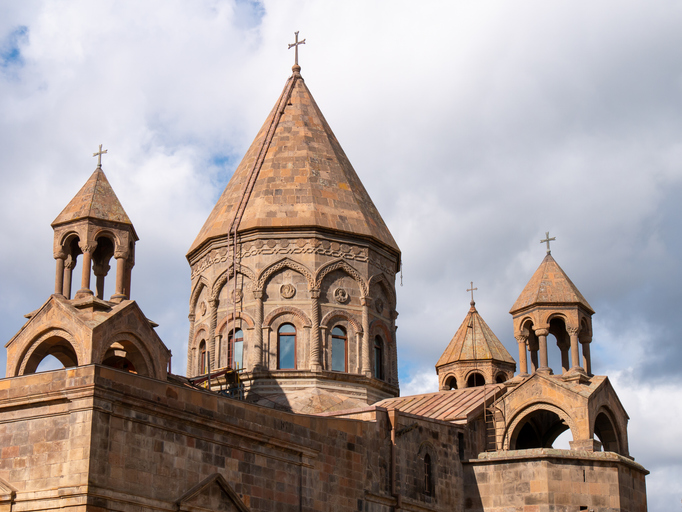When Armenia adopted Christianity as its state faith in 301 AD, Rome was still persecuting Christians and the Anglo-Saxons had yet to reach Britain. The Armenian Apostolic Holy Church (AAHC) has endured and survived the onslaughts of Persians, Ottomans and Soviets. Yet in 2025 it faces persecution once again, this time from its own elected government.
A new report by the international law firm Amsterdam & Partners lays bare an extraordinary assault on the Church by Prime Minister Nikol Pashinyan. His government has jailed bishops and priests and smeared the supreme patriarch. It has also imprisoned the Church’s leading benefactor, businessman Samvel Karapetyan – a major philanthropist who has funded schools, hospitals, and the restoration of ancient churches – in a notorious Soviet-era jail in the Armenian capital, Yerevan. His “crime” was to speak publicly in defence of the Church.
The Armenian government’s behaviour would shame any democracy. It has sought to overthrow the patriarch, His Holiness Karekin II, Catholicos of All Armenians, directing online diatribes of a sort unthinkable in any civilised country. One archbishop, Mikayel Ajapahyan, is serving a two-year sentence for the apparent offence of criticising the government. Karapetyan’s companies, including Armenia’s electricity utility, have been seized. It is political persecution dressed up as law enforcement.
Armenia’s constitution grants the AAHC an “exclusive mission” in the nation’s spiritual life, recognising its unique role in the preservation of Armenian identity. The report accuses Pashinyan of trampling on those guarantees and committing widespread breaches of human rights. Alison Meuse, a respected journalist and regional expert, warns that the Church “has not faced such an existential threat since the harshest years of the Soviet purges”.
The origins of the repression lie in the catastrophic military defeat of 2023, when Azerbaijan’s assault on the Armenian enclave of Nagorno-Karabakh displaced more than 100,000 Armenian Christians. The Church, true to its vocation, defended their rights, appealing to the international community to safeguard Armenian cultural and religious heritage and provide humanitarian relief for the displaced.
Pashinyan, who was widely blamed for the loss, has chosen to deflect that blame onto the one institution that still commands public confidence. A poll last year found that the Church commands the trust of almost 80 per cent of Armenians, compared with barely 30 per cent who trust the government. It is the classic pattern of an insecure ruler lashing out at an institution he cannot control.
The symbolism could scarcely be starker. The government of the world’s oldest Christian nation, the first to raise the Cross above the crescent and the hammer and sickle alike, now persecutes its own clergy. The message is chilling: faith itself is a political crime in Armenia.
Western governments have been shamefully silent. Armenia, sandwiched between Russia, Iran and Turkey, is a geopolitical pawn, useful to the West when seeking to court Yerevan away from Moscow, tolerated when it violates basic freedoms. But Britain, the EU and the United States all profess to uphold religious liberty. Their embassies should be demanding the release of Samvel Karapetyan and the reinstatement of constitutional protections for the AAHC.
Armenia’s tragedy is not only political but spiritual. For seventeen centuries the AAHC has been the custodian of Armenian identity, language and national survival. It endured genocide, exile and Soviet atheism. That it now faces repression from its own government is a moral disgrace. The West cannot claim ignorance; the evidence is in black and white, published by a respected international law firm with offices in London and Washington.
Furthermore, if Christian leaders in Canterbury and Rome, both represented within the World Council of Churches in Geneva, are serious about support for the persecuted Church, they must now speak with their own voices. The WCC has expressed concern, but national churches and the Vatican have yet to match that concern with public pressure on Yerevan. Silence will be read in Yerevan as acquiescence, and as licence in Baku, Ankara and Tehran.
History teaches that attacks on faith rarely stop at the church door. A government that imprisons priests and philanthropists today will muzzle journalists and judges tomorrow. Armenia’s Western allies should make clear that persecution of Christian believers is incompatible with friendship, aid or association with the democratic world.
Samvel Karapetyan’s imprisonment and the intimidation of Catholicos Karekin II are a test of Western principle. If we look away now, we abandon not only a brave philanthropist and a venerable Church, but the very idea that the West still cares for freedom of conscience. Christianity’s oldest nation deserves better than to be ruled by fear.
What is the significance of Thanksgiving for Christians?
National Trust asked to reconsider after filmmaker denied permission to film at Christian site
Mel Gibson’s screenwriter says ‘Passion’ sequel emerged from talk about Protestantism
Christianity under siege in the world’s oldest Christian nation
Mozambique crisis deepens as Christians killed and thousands displaced in new wave of extremist attacks
Charter launched to protect street preachers from arrest
Christian street preacher cleared in harassment case
The triumph of Christianity over the Viking raiders
18 church leaders arrested in China as part of crackdown
The decades long exodus of Anglican clergy into Catholicism
The National Trust said it was looking into the matter.
Mervyn Thomas said the US was right to redesignate Nigeria a “Country of Particular Concern” after an “unprecedented rise in insecurity”.
One victim was told domestic violence was her cross to bear.
Every fourth Thursday of November, Americans mark Thanksgiving. American Thanksgiving is a relatively modern tradition, but the principle behind it has a long biblical basis and liturgical history. This is the story …
